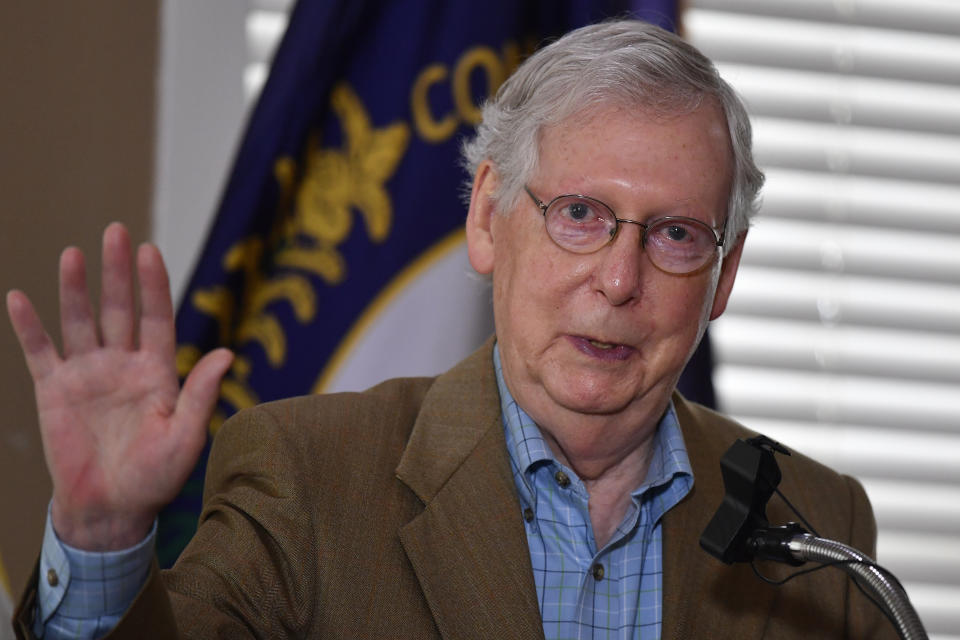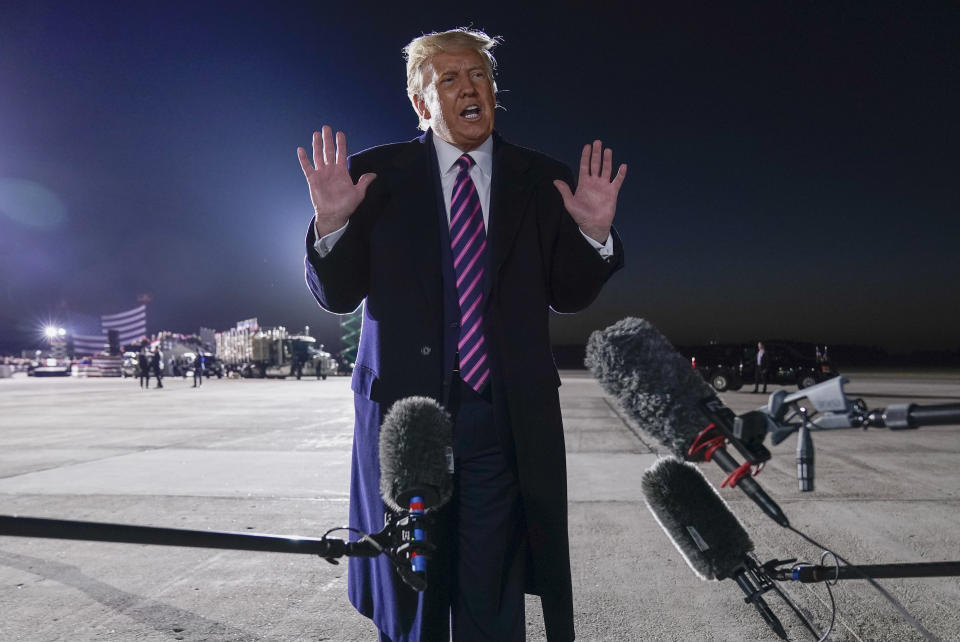McConnell vows to move forward with replacing Ginsburg, but does he have the votes?
- Oops!Something went wrong.Please try again later.
- Oops!Something went wrong.Please try again later.
WASHINGTON — Mitch McConnell vowed to hold a vote on a replacement for Ruth Bader Ginsburg, but the big question is whether he has the votes to confirm a Supreme Court Justice only six weeks before the presidential election.
Two Republican senators, Lisa Murkowski of Alaska and Susan Collins of Maine, have said recently that they would not vote for a Supreme Court nominee if a justice died or retired close to the presidential election.
Collins told a New York Times reporter earlier this month that she would not vote for a nominee in October. “I think that’s too close, I really do,” Collins said.
Murkowski told an Alaska Public Media reporter on Friday, just hours before Ginsburg died, that she would not vote on a nominee before the election.
PHOTOS: Justice Ruth Bader Ginsburg — A look back
Sen. Mitt Romney, R-Utah, is also likely to oppose any nominee put forward this close to the election.
McConnell has a 53-47 majority in the Senate, so he can technically afford to lose three Republican votes, because Vice President Mike Pence could break a tie and cast the deciding vote.
But there are a lot of other unknowns. Sen. Chuck Grassley, R-Iowa, said in 2018 that if he was chairman of the Senate Judiciary Committee, he would not bring up a Supreme Court nominee in an election year. But Grassley’s comments were not an ironclad pledge not to vote for a nominee in an election year.
In addition, the Judiciary Committee is now chaired by Sen. Lindsey Graham, R-S.C., who has already flip-flopped on the issue. In 2018, Graham said, “If an opening comes in the last year of President Trump's term, and the primary process has started, we’ll wait to the next election.” But this past May, Graham reversed himself, saying that the standard was whether the Senate was held by a party different than that of the president’s.

This is the same justification that McConnell used on Friday night to justify his push forward with a nominee for Trump, despite having stonewalled President Barack Obama’s nominee in 2016 when conservative Justice Antonin Scalia died in February of the election year.
But McConnell’s main argument for blocking Obama’s nominee after Scalia died — which on its own was an enormous break with Senate norms — was that the Senate should not vote on a nominee during an election year.
“The American people should have a voice in the selection of their next Supreme Court Justice. Therefore, this vacancy should not be filled until we have a new president,” McConnell said hours after Scalia died. His initial statement said nothing about divided government.
Ten days later, in his first press conference after Scalia’s death in 2016, McConnell did mention the fact that no Supreme Court Justice had been confirmed by a Senate of the opposite party from the president since 1888, but he leaned most aggressively into the fact that it was an election year.
“We know what would happen if the shoe was on the other foot. We know what would happen. A nominee of a Republican president would not be confirmed by a Democratic Senate when the vacancy was created in a presidential election year. That’s a fact,” McConnell said.
The argument about divided government is not entirely a reverse-engineered construct, but it’s a thin reed.
There are two scenarios to play out. Can McConnell get 51 votes before the election, and can he get them after the election?

Even if Grassley folds like Graham, that leaves the three Republicans who are likely to resist a Trump nominee before the election: Collins, Murkowski and Romney. Collins will be under the greatest pressure since she is in a heated race for reelection and currently trails her challenger in the polls.
But while Pence could break a 50-50 tie, there is one other Republican senator up for reelection — Sen. Thom Tillis of North Carolina — who would not want to cast the deciding vote on a lifetime appointment to the nation’s highest court. Other Republicans up for reelection, in particular Sen. Cory Gardner in Colorado and Sen. Martha McSally in Arizona, are likely to lose this November, and therefore have little incentive to vote against Trump if they harbor political ambitions for the future, which both clearly do.
There are a number of other Republicans who might theoretically vote against a nominee. However, if Democrats have learned anything from the Trump era, it has been that when Republicans have to choose between principle and Trump, the president usually wins.
Nonetheless, Republicans such as Sen. Lamar Alexander of Tennessee, who is retiring, and Sen. Ben Sasse of Nebraska, may still have something of an independent streak, and could refuse to go along with any plans to ram through a Trump nominee.
But if Trump were to lose the election, that would present a new Rubik’s Cube of political considerations. It could mean that McConnell would have an easier time getting 51 votes once Republicans like Collins and Tillis felt freed from immediate political constraints.
But on the other hand, the public outrage at a defeated president trying to install a Supreme Court justice on his way out would likely draw massive public protests and outrage. And there are some signs that normally reliable Trump allies in the Senate may tread carefully in the weeks to come.
“The most difficult months in a generation are now upon us. Pray that God protect our country and provide wisdom to our people,” said Sen. Marco Rubio, R-Fla., in a tweet on Friday.
_____
Read more from Yahoo News:



